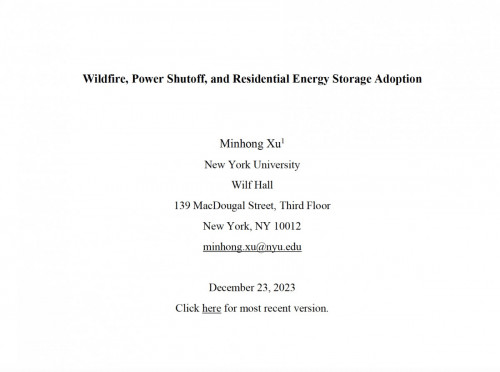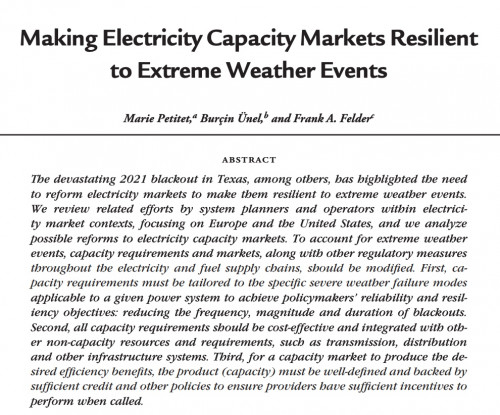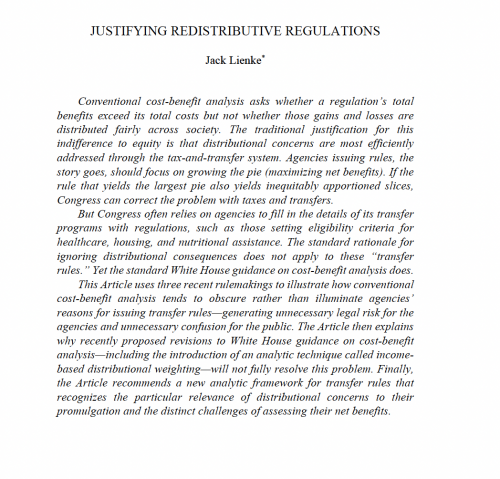-

Wildfire, Power Shutoff, and Residential Energy Storage Adoption
Extreme weather poses a growing threat to electrical grid stability. On-site battery storage connected to solar power —known as a solar-plus-storage system—can buffer the impact. Despite its crucial benefits, the widespread adoption of this technology is hindered by its high costs. This study examines the impact of recent salient events—namely, preemptive power shutoffs to prevent wildfires, or Public Safety Power Shutoffs (PSPSs)—on residential solar-plus-storage adoption. I demonstrate that while communities at risk of wildfires lacked proactive investments before wildfire seasons, prolonged PSPSs increased solar-plus-storage adoption during the subsequent two months. This increased storage uptake can be attributed to heightened awareness of the need for backup power. Additionally, households’ choices between purchasing and leasing options were influenced by latent wildfire hazards and education levels. These findings highlight the role of risk awareness in promoting storage adoption and underscore the potential for using public information to enhance wildfire preparedness. -
Comments to PJM on the Resource Adequacy Critical Issue Fast Path
PJM Interconnection, which oversees wholesale electricity market operations for the mid-Atlantic region, is undergoing reforms to improve how the market values and prices generation capacity to ensure reliability. Policy Integrity submitted comments focused on PJM's proposed shift to a seasonal capacity market design and other proposed changes to reliability metrics.
-
Comments on the Consideration of Climate Benefits in Proposed Rule to Limit Methane Leakage from Gas Pipelines
In May, the Pipeline and Hazardous Materials Safety Administration released a draft regulation to prevent methane leaks from gas pipelines. The agency monetized the climate benefits of the regulation using the social cost of methane, finding that monetized benefits exceeded monetized costs by at least $340 million per year. In our comment letter, we support the agency for applying the social cost of greenhouse gases to estimate the climate benefits of the proposed rule. We also suggest that PHMSA apply additional analysis to each rule using draft updated climate-damage valuations that the Environmental Protection Agency released in November 2022.
-
Comments to NYSPSC on Its 2040 Zero-Emissions Electricity Goal
The New York State Public Service Commission recently issued an order seeking input on how to achieve the state's goal of a zero-emissions electricity system by 2040, as required by the Climate Leadership and Community Protection Act (CLCPA). Policy Integrity submitted comments focused on issues such as the relationship between the Commission’s 2040 zero-emissions goal and other elements of the CLCPA, the need for analytic frameworks that rely on best available science and economics, the circumstances under which hydrogen could qualify as a zero-emissions resource, and tracking benefits to disadvantaged communities.
-

Making Electricity Capacity Markets Resilient to Extreme Weather Events
The devastating 2021 blackout in Texas, among others, has highlighted the need to reform electricity markets to make them resilient to extreme weather events. In this paper, we review related efforts by system planners and operators within electricity market contexts, focusing on Europe and the United States, and we analyze possible reforms to electricity capacity markets. To account for extreme weather events, capacity requirements and markets, along with other regulatory measures throughout the electricity and fuel supply chains, should be modified. First, capacity requirements must be tailored to the specific severe weather failure modes applicable to a given power system to achieve policymakers' reliability and resiliency objectives: reducing the frequency, magnitude and duration of blackouts. Second, all capacity requirements should be cost-effective and integrated with other non-capacity resources and requirements, such as transmission, distribution and other infrastructure systems. Third, for a capacity market to produce the desired efficiency benefits, the product (capacity) must be well-defined and backed by sufficient credit and other policies to ensure providers have sufficient incentives to perform when called.
-
Amicus Brief in D.C. Circuit Opposing FERC Pipeline Approval
The Federal Energy Regulatory Commission (FERC) recently approved the construction of a new natural gas pipeline that would run through New Jersey and Pennsylvania. The gas capacity this expensive pipeline would provide, most of which will serve New Jersey markets, is unnecessary to meet the demand of New Jersey customers: the New Jersey Board of Public Utilities commissioned a study that demonstrates as much. We submitted an amicus brief in support of petitioners challenging this pipeline. In our brief, we explain that, in approving pipeline applications, FERC has abdicated its statutory responsibility to examine whether a pipeline is truly needed. Instead of determining whether a pipeline would serve the public interest, FERC defers to the assertions of profit-motivated pipeline developers and their customers. FERC's practice of approving needless pipelines is particularly concerning in light of how it regulates the development of electric transmission infrastructure, a related regulatory process. We argue that FERC should have placed greater weight on the rigorous economic study conducted by an expert state agency charged with ensuring safe and adequate gas supply for its residents.
-

Justifying Redistributive Regulations
Congress often relies on agencies to fill in the details of its transfer programs with regulations, such as those setting eligibility criteria for healthcare, housing, and nutritional assistance. This Article uses three recent rulemakings to illustrate how conventional cost-benefit analysis tends to obscure rather than illuminate agencies’ (often distributional) reasons for issuing such transfer regulations—generating unnecessary legal risk for the agencies and unnecessary confusion for the public. The Article then explains why recently proposed revisions to White House guidance on cost-benefit analysis—including the introduction of an analytic technique called income-based distributional weighting—will not fully resolve this problem. Finally, the Article recommends a new analytic framework for transfer regulations that recognizes the particular relevance of distributional concerns to their promulgation and the distinct challenges of assessing their net benefits.
-
Comments to EPA on GHG Regulations for Fossil Fuel-Fired Power Plants
In May 2023, EPA proposed a package of regulations to limit greenhouse gas emissions from fossil fuel-fired power plants under Section 111 of the Clean Air Act. This proposal included revisions to strengthen the limits for new gas fired-plants and to establish limits for existing coal-fired plants and some of the largest, existing gas-fired plants. To determine the stringency of these limits, EPA identified “best systems of emission reduction” (BSERs). In our comments we explain how EPA’s has selected BSERs that are traditional in scope and consistent with the legal pathway left intact by the Supreme Court’s decision in West Virginia v. EPA. We also recommend that EPA strengthen the design of the rule to ensure it best fulfills its goal to reduce GHG emissions, which endanger public health and welfare, in a manner that avoids creating perverse incentives.
-
Plenary Remarks at the New Jersey Board of Public Utilities Technical Conference on Natural Gas Emissions Reduction
On August 2nd and 3rd, the New Jersey Board of Public Utilities (BPU) hosted a Technical Conference in order to engage with stakeholders and investigate how the natural gas industry can best meet a 50% reduction in greenhouse gas emissions below 2006 levels by 2030. Jenn Danis gave plenary remarks on this topic during the second day of the conference. Her remarks focused on the need for holistic, long-term gas planning at the level of the state utility regulator. Without this planning, BPU will not be able to fulfill its responsibilities, which include ensuring just and reasonable rates for consumers as well as protecting gas utilities that will continue to provide crucial services for some time.
-
Comments to DOE on National Interest Electric Transmission Corridors
The Department of Energy (DOE) issued a Request for Information regarding its program to designate National Interest Electric Transmission Corridors in areas with a need for new electric transmission capacity. We submitted comments to DOE recommending that the agency require some additional information from applicants: how a project in a designated corridor would cause power plants to increase or decrease emissions in response to the new transmission capacity and how environmental justice communities would be affected. We also recommended that DOE review applications in groups to best account for the interconnected nature of the electric grid. Finally, we recommended that DOE standardize certain modeling techniques and inputs to increase the accuracy of developers’ applications and to enable DOE to conduct apples-to-apples comparisons.










